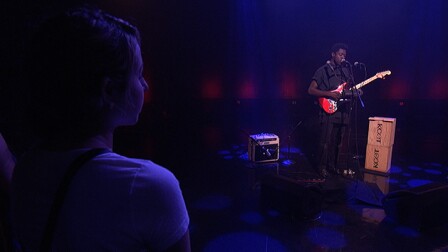
Tijuana Panthers: Breaking Out of Long Beach
Watch the band's full performance on KCET-TV. Click here for future air dates.
The members of Tijuana Panthers -- Daniel Michicoff, Chad Wachtel and Phil Shaheen -- have known each other since their teenage years in Long Beach. Back then, they surfed, rode skateboards and went to pool parties. It wasn't until after high school that music became their mutual pursuit. Shaheen and Michicoff played together in a group called The Fancy Lads back in 1999. At some point, Shaheen and Wachtel played together too. By 2006, the three had come together to form Tijuana Panthers. Now in their 30s, the musicians comprise one of the break-out bands from their hometown scene.
Shaheen describes Long Beach as an unusual intersection between Los Angeles and Orange County. "It's just this weird port city that kinda pulls stuff from both places," he tells Studio A. Separate from both downtown Los Angeles and Orange County by a string of freeways, Long Beach blossomed into a musical hub in its own right. It's part of L.A. County, but unlike other neighboring cities, Long Beach has a bounty of clubs and events to support its local talent. Some of those locals -- The Shock, Hot Rod Todd, The Golddiggers, The Growlers and Grand Elegance among them-- influenced Tijuana Panthers and, later, became their friends. These bands may all be united by a garage-y rock sound, but that's not all that exists in the city by the Pacific Ocean. Wachtel is quick to point out the diversity among Long Beach musicians, from hip-hop to metal. Shaheen adds that, when Tijuana Panthers started, they were part of a "small niche." However, their beach-y, garage-meet-post-punk sound took off.

Tijuana Panthers' sound is hard to pinpoint. Like the city where they're based, the band mashes together a lot of different influences. "Chad's got that wicked Link Wray sound with his guitar," says Michicoff, adding that Wachtel can channel bands like The Misfits. They're fans of artists who found their footing in the aftermath of punk rock: Ian Dury, Orange Juice and Talking Heads are high on the list. Wachtel adds that he was influenced by an older sister who was big on 1980s icons like Echo and the Bunnymen and the Smiths. Plus, thanks to his dad, he discovered surf music at a young age.
Now on their third album, Tijuana Panthers has amassed a collection of stories, their own as well as ones related by friends, that influence every aspect of the band. The name itself comes from a tale spun by Shaheen's late neighbor, who traveled to Tijuana, bought a porcelain panther and got into a night fight.
The latest album, "Wayne Interest," comes from a saying that Shaheen claims is used by Germans. "It means just 'who care,'" he says. His bandmates, however, are skeptical.
"Sometimes, I think Phil made it up and it's not even real," says Wachtel. Michicoff agrees.
The album itself came together almost by chance. Michicoff met producer Richard Swift through a friend late one night while they were drinking. Swift invited the band to visit his place in Oregon and record on a 4-track. It took one-and-a-half days to get through 10 songs.

"We weren't intending to do the lo-fi thing for the sake of lo-fi," says Michicoff. Instead, the decision was made because Smith nailed the band's sound. Since the band is a three-piece, they kept it simple. Swift encouraged them to avoid recording parts that they wouldn't be able to play live, although there are a few bits that were added in post-production.
"Cherry Street," which appears on "Wayne Interest," is loosely inspired by an incident that Shaheen spotted on Long Beach's Cherry Avenue involving a group of police cars gathered in a small parking lot. "I just, you know, made this assumption in my head of maybe what happened," he says. Meanwhile, "NOBO" stems from and inside joke with their producer Swift and Cold War Kids' Matt Moss. Michicoff says, "I don't want to give too much away." What he explains is complicated, but largely based on seeing people without ambition-- "They're just trying to be angry at the world and drink a lot," he says, "And, I am wondering how they can afford the free time."
Time is limited for Tijuana Panthers. They work day jobs in addition to playing music. Wachtel helps out his his mother at her antiques and craft shop. He also does woodworking for a furniture designer. Shaheen is a teacher. The band isn't something that he likes to mention when he's at school, although he believes that the principal and teachers know about it. The double-life gets a little tricky as Tijuana Panthers becomes more popular, particularly when they played Coachella a few years ago. Shaheen says that "for years and years and years" nobody at the school knew that he had a band. Of course, when you make your mark in the music world, that all changes.











